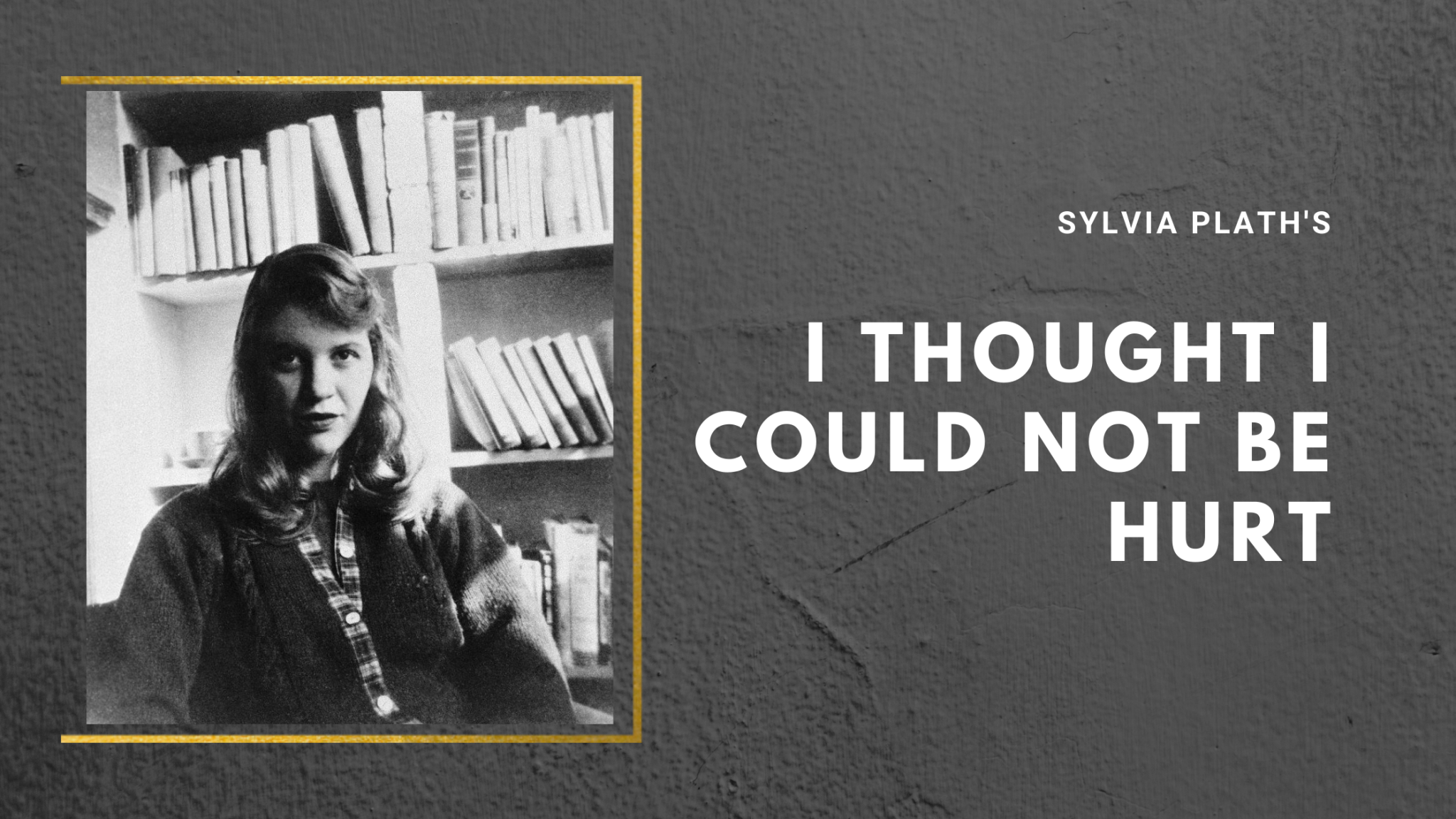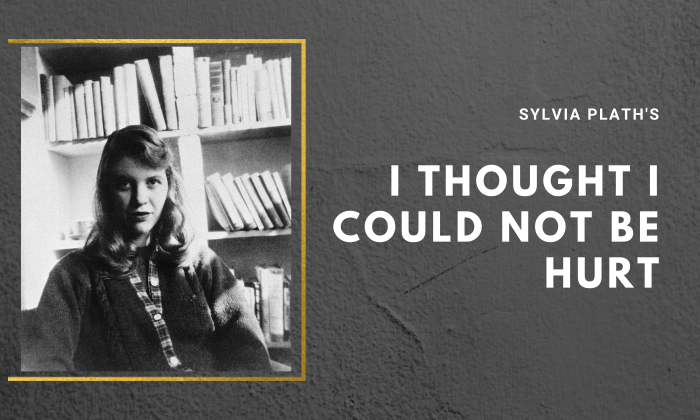I Thought I Could Not Be Hurt – The Poem
I thought that I could not be hurt;
I thought that I must surely be
impervious to suffering —
immune to mental pain
or agony.
My world was warm with April sun
my thoughts were spangled green and gold;
my soul filled up with joy, yet felt
the sharp, sweet pain that only joy
can hold.
My spirit soared above the gulls
that, swooping breathlessly so high
o’erhead, now seem to brush their whir-
ring wings against the blue roof
of the sky.
(How frail the human heart must be —
a throbbing pulse, a trembling thing —
a fragile, shining instrument
of crystal, which can either weep,
or sing.)
Then, suddenly my world turned gray,
and darkness wiped aside my joy.
A dull and aching void was left
where careless hands had reached out to destroy
my silver web of happiness.
The hands then stopped in wonderment,
for, loving me, they wept to see
the tattered ruins of my firma-
meant.
(How frail the human heart must be —
a throbbing pulse, a trembling thing —
a fragile, shining instrument
of crystal, which can either weep,
or sing.)
Little Things Matter Most – A Short Story
I remember a week before our prom-night. My best friend was one of the best dancers in the college and one of the most popular athletes. Almost, every guy wanted her to be his date for the night.
Of course, there were many proposals. There were chocolates, cards, flowers, and some expensive gifts as well. There were proposals from different boys as well. The captain of the basketball team proposed the topper of the class came, the president of the college proposed, the son of the dean proposed. Till the day before the night, she hadn’t said yes to any of them. I asked her, “Who are you waiting for?” She smiled and did not answer.
That evening a junior, someone we had never seen before in college, came up to her. He was a not so tall, slightly overweight, nerd looking guy. He came and managed to as her out for prom night. Though he said he knew the answer would be no. To my surprise, she immediately said yes.
I was shocked and asked her ‘why’. She said, “didn’t you notice the way he pulled the breath in, so as to look flat-stomached. Wasn’t that cute?” Yes, I hadn’t noticed. But I understood she had seen the courage he had to gather, to be able to talk to her. It must have been really tough for him.
Moral of the story: LITTLE THINGS/GESTURES ALWAYS HAVE MAXIMUM IMPACT.
.
.
.
.
.
.
Fast Forward >>>>>>> 10 years later.
.
.
She is still one of my best friends. I remember it was the 1st day of May 2018, around 2 pm. I just wrapped up the morning sessions at the office and was taking a 15-minute break. I received a call from her mother. She was almost crying and started asking questions non-stop, “I know, if there is something, you know the reason. Did she have a heartbreak? Is everything fine at her office? Is someone stalking her or troubling her? Are all your friends fine? Are you taking drugs?” I took a deep breath and asked, “Wait aunty, first tell me what happened. I haven’t talked to her in the last two days.” Aunty started crying again. I was getting worried now. On my insisting she said, “she hasn’t come out of her room for the last three days. She is barely speaking or eating anything. Looks like she is having trouble with something. Something is really bothering her.”
I breathed with a sigh of relief. I called her and told her, “Don’t worry, the original six avengers are still alive. This is not the end, they will bring others back from the dead.” I didn’t saw her (we were on the phone), but I know she smiled and said “Maybe you are right, everything will be fine.” I said, “now go outside and eat something, your mom is worried that we are doing drugs.” She said, “What?” and hang up the phone.
.
.
.
.
See, I told you people- Little things, the most unexpected ones, can have a massive impact. It can turn your world upside down.
Sylvia Plath
Sylvia Plath (October 27, 1932 – February 11, 1963) was an American poet, novelist, and short-story writer. She is credited with advancing the genre of confessional poetry and is best known for two of her published collections, The Colossus and Other Poems and Ariel, as well as The Bell Jar, a semi-autobiographical novel published shortly before her death. In 1981 The Collected Poems were published, including many previously unpublished works. For this collection Plath was awarded a posthumous Pulitzer Prize in Poetry in 1982, making her the first to receive this honor posthumously.
Born in Boston, Massachusetts, Plath studied at Smith College in Massachusetts and at Newnham College in Cambridge, England. She married fellow poet Ted Hughes in 1956, and they lived together in the United States and then in England. They had two children before separating in 1962.
Plath was clinically depressed for most of her adult life and was treated multiple times with electroconvulsive therapy (ECT). She died by suicide in 1963.
To read more about Sylvia Plath, click here.
I Thought I Could Not Be Hurt – Poem Analysis
This was one of the first poems by teenaged Sylvia Plath, covered by the undertone of anguish.
She had drawn a still life painting. As excitedly she showed the painting to her grandmother, the doorbell rang. Her grandmother got up to welcome the guest. She removed her apron and threw it on the table on which the painting was lying. Apron hit the painting and blurred a part of the pastel painting.
Sylvia then went to her room and wrote this poem.
When she showed the poem to her teacher, she showed it to one of her colleagues. On reading the poem he said, “Incredible that one so young could have experienced anything so devastating.” The teacher told this to her mother.
And when her mother told about the response about the poem to young Sylvia, she said “Once a poem is made available to the public, the right of interpretation belongs to the reader.“
In this poem, the first three stanzas clearly explain how happy and joyful the life of the speaker is. All the metaphors used such as seagulls, April sun, green color, are good indicators of a young girl’s exuberant life. A life, yet untouched by any sorrow.
The fourth paragraph, which is a refrain, is the beginning of an indication that something worst is about to happen.
Finally, in the fifth paragraph, there is a sudden change in tone. Clear imagery to show the world of the speaker has turned upside-down. The torment of the speaker can be seen in the rest of the poem.
I Thought That I Could Not be Hurt – Form, Structure, & Meter
- The poem does not follow a rhyming scheme.
- The first three lines of each stanza are made up of 8 syllables.
- The poem mostly follows a trochee meter with a stressed foot followed by an unstressed one.
- The fourth and seventh stanza of the poem is a refrain.









I like this poem, especially after reading its background history. Thank you for sharing it. ❤️😊